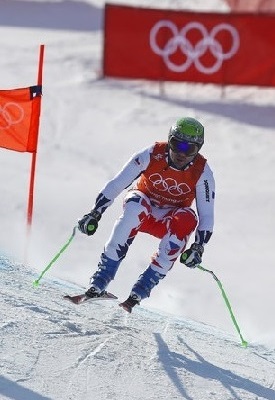2018 Winter Olympics: Alpine Skiing


Winter 2018 sees a new event and a new slope

Related Links
Memorable Moments
Before it was a sport, skiing was an important means of transportation.
The exact origin of skiing is unclear, but there is evidence that Scandinavians were using skis to travel and hunt over snow-covered terrain as far back as 4,000 years ago.
Organized slalom races were first introduced in Europe during the 1920s and the first world championship was organized in 1931. Shortly thereafter, Americans caught on and interest in this country snowballed throughout the 1930s.
Alpine skiing made its Olympic debut at the 1936 Garmisch-Partenkirchen Games with a men's and women's combined event, featuring a downhill and two slalom runs. Giant slalom first appeared at the 1952 Oslo Games and the super giant slalom, or super G, was added at the 1988 Calgary Games. This year's games see the introduction of a new team event, confirmed by the International Olympic Committee in Lausanne in 2015. This marks a notable first in the otherwise very individual sport.
The events
Men and women will each compete in six Alpine skiing events in the Pyeongchang Games:
- downhill: a steep descent against time
- slalom: a short race featuring sharp turns around flags
- giant slalom: longer, looser version of the slalom
- super-G: slalom race that is a bit faster and longer than the giant slalom
- combined: one downhill run followed by two slalom runs; fastest combined time wins
- team event: national teams of two men and two women compete in head-to-head slalom races
The Pyeongchang Games
The Alpine events this year are held in two separate venues. Men's and women's slalom and giant slalom, and the new team event, will be held at the Yongpyong Alpine Centre, in Pyeongchang. The Yongpyong resort has before hosted four FIS Alpine World Cups, and once held the IPC World Cup for the Disabled, but this will be its first Olympic use. All downhill, super-G, and combined events will be held at the Jeongseon Alpine Centre, a newly developed ski area at Mount Gariwang in Jeongseon.
The development of Jeongseon has proven controversial among environmentalists. There were no ski slopes in Korea that met the Olympic height requirement for Men's downhill, and so the planning committee elected to develop possibly its only mountain of a suitable size. Mount Gariwang, however, has been protected for several centuries. It hosts one of Korea's few remaining undeveloped forests and a diverse population of indigenous species. In response to criticism, the government has declared its intention to replant the bulldozed forest after the 2018 Games have concluded, though fears remain about the lasting ecological harm.
The Alpine events begin with men's downhill on Feb. 11, and will conclude with the team event on Feb 24.
More about the 2018 Winter Olympics
